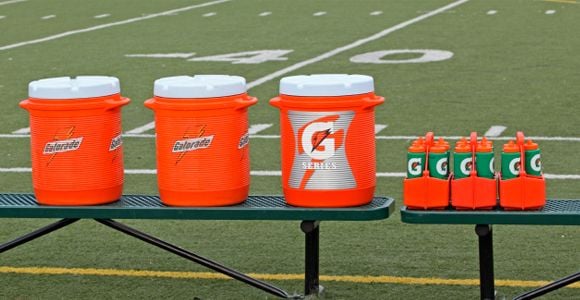A doctor at the hospital where I work likes to say that soda is the same thing as poison. As a dietitian, I would say soda is a major problem for most of my patients who are overweight, but I think poison is stretching it a little. Demonizing something that a person is addicted to only makes the addict feel ashamed of their problem. Then they hide their use from anyone that might be able to help.
On the other extreme, sports drinks are promoted as healthy, helpful beverages that improve your sports performance. Many of my peers never really bought into that line because if you take a good look at the science, you'll see that the studies were poorly designed, paid for generally by the companies promoting the drinks, and any benefit found was for athletes in extreme situations rarely seen by the average American. I share this information with my patients when I see that sports drinks are contributing to their weight problem, but I think my voice gets lost in the millions of dollars spent on ads to get people to buy, buy, buy these drinks.
Not too long ago there was a bit of a news stir when the British Journal of Medicine put out a press release about a group of studies that found that when looking at the claims of sports drinks, the science is generally poorly designed, funded by the profiting companies, and had only limited benefits in highly trained athletes exercising at an intensive rate for more than 90 minutes. Furthermore, they found that these sports drinks are a contributing factor in the childhood obesity epidemic.
The studies haven't told health professionals anything they didn't already know. For the most part, the studies didn't find anything that most sports professionals don't know either. It's unfortunate, however, that the studies' brief day or two in the limelight will likely not enlighten most of the people that are not familiar with the lies they are being sold by companies who claim to have their consumers' best interest in mind but are really only focused on their bottom line.
Since the 1970s, when the Gatorade Institute was established, we've 'learned' that dehydration hides behind every workout. Be afraid, be very afraid because if you don't hydrate, and with the right kind of liquid, you'll be in trouble. The study found that claim was completely unfounded. The lesson? Apparently money can buy science. Consumers should be more afraid of that than dehydration from moderate exercise.
If you work out, or your child participates in sports, water will do just fine. Bring a healthy snack like an apple or banana along too, to replenish the electrolytes you may have lost in your perspiration and provide you with a bit of carbohydrate to replete your energy. No big drink company is going to support the claim that they are just as good, if not better, for you than the sports drinks, but it's probably better to let health professionals be your guide than for profit industry.
Jennifer Webb, MS, RD, CNSC is a practicing dietitian and freelance writer based out of Southern California. She has been practicing medical nutrition therapy for the past five years. Prior to her career in nutrition, she received a degree in early childhood development. She has combined her two passions, nutrition and family, into a career educating people about the impact food can have on health across the lifespan. She is currently a dietitian at a top children's hospital and runs a private practice. Her private practice specializes in family nutrition therapy, a technique that focuses on changing family habits to lead them to lifelong healthy lifestyles. Contact Jennifer at [email protected].



